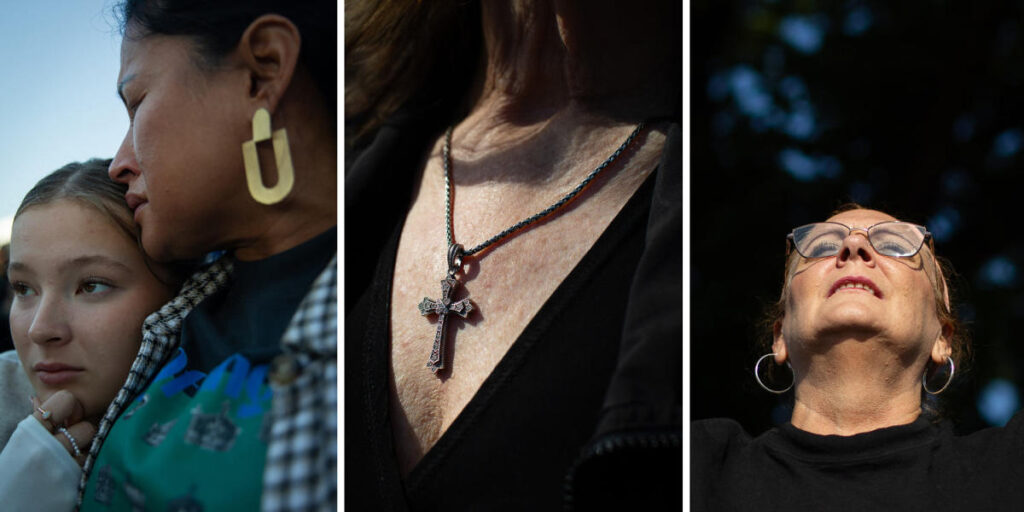On a recent Saturday, tens of thousands of evangelical Christians converged on the National Mall in Washington, D.C., for an event dubbed “A Million Women.” Organized as a rallying cry for the upcoming presidential election, the gathering was framed as a critical moment to pray for America’s spiritual atonement and the possible re-election of Donald Trump. Event organizers portrayed the occasion as a “last stand moment” against perceived forces of darkness threatening the nation. Participants engaged in singing worship songs, waving flags symbolizing their belief in America’s Christian foundations, and fervently praying for divine intervention on Trump’s behalf in the approaching November elections. By attending, rally participants expressed their commitment to counter what they view as secular pressures that could lead to the deterioration of the nation’s moral fabric.
Among the attendees was Grace Lin, a woman who traveled from Los Angeles and donned a “Make America Great Again” hat, declaring the necessity of standing against what she perceives to be the enemy’s encroachment on American values. Echoing the thoughts of many present, she expressed urgency in the fight against forces she believes could lead to the country’s demise. Lou Engle, a key organizer of the event and a prominent figure within the New Apostolic Reformation movement, articulated his belief that he was commanded by God to unite women in a march for America’s restoration. For Engle and many others, Trump represents a flawed yet divinely chosen figure, essential for redeeming a nation that they perceive as engulfed in moral crisis.
Speakers at the rally highlighted a range of social issues they associate with declining morality, including crime, abortion, and LGBTQ acceptance. Thousands attended wearing pink “Don’t Mess With Our Kids” shirts, a slogan endorsed by an anti-LGBTQ group that accuses public institutions of promoting gender identity confusion among children. Susan Marsh, a participant from Maryland, articulated fears about future societal pressures her grandchild may face, suggesting that children are undergoing unnecessary surgeries based on misguided notions of gender identity. The deep concern for children’s well-being underscored the gathering’s emotional tone, with many attendees viewing contemporary cultural shifts as symptomatic of a larger crisis demanding spiritual backtracking to biblical values.
The event attracted a wide demographic, showcasing a blend of racial and ethnic backgrounds that is somewhat atypical for conservative political gatherings. Even certain majority-Black churches participated, illustrating that the rally’s core issues resonate across various communities. Despite the focus on an apocalyptic narrative around the election, many attendees maintained optimistic perspectives, with people like Maryn Freitag from Minnesota expressing unwavering support for Trump as “God’s choice” for president. The atmosphere reflected a pervasive belief that failing to secure a Trump victory would plunge America into a dire state, leading individuals like Freitag to existentially contemplate the implications of a Biden administration.
Academics and scholars, like Matthew Taylor, have expressed grave concerns regarding the fervor evident at such rallies and the accompanying apocalyptic rhetoric among the Christian right. He warns that the intense political narratives can nurture a mindset that might lead to volatile behaviors similar to the events surrounding the January 6 Capitol riots. Such messaging casts Trump as a pivotal figure in an ideological battle between good and evil, further solidifying his support base through spiritual significance rather than promoting traditional political discourse. Taylor’s observations suggest a troubling trend that intertwines faith with an increasingly aggressive political stance, which could pose risks for civil society.
While some participants embraced a hopeful future where righteousness prevails regardless of electoral outcomes, many others expressed palpable fears of societal decline if Trump loses to Vice President Kamala Harris. Phil Heilman, hailing from Florida, noted his apprehensions regarding the implications of a Democratic victory, yet he remains hopeful of divine intervention and covert means to reclaim the nation for conservative Christian values. The rally’s invocation of spiritual warfare extended to a tricky discourse about the LGBTQ community, with prayers directed towards “the rainbow people” as individuals needing salvation that reflects a widespread conviction that societal norms are in peril. Overall, “A Million Women” not only marked an earnest religious gathering but also exemplified the broader, complex interplay between faith and politics as evangelical Christians engage in an ongoing struggle to shape America’s future against what they see as a spiritually tumultuous landscape.

